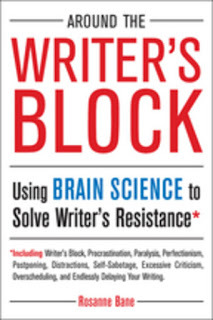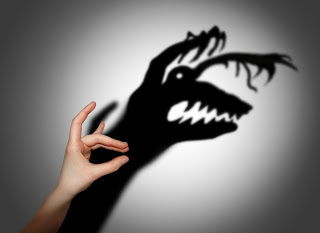What Are You Afraid Of?
 For Christmas this year the SO bought me a book titled
Around the Writer's Block
(Using Brain Science to Solve Writer's Resistance*).
For Christmas this year the SO bought me a book titled
Around the Writer's Block
(Using Brain Science to Solve Writer's Resistance*).I was a little resistant to the very idea of this book, largely because of the words WRITER'S BLOCK. I have little patience with the concept of Writer's Block. IMHO usually what people call writer's block is one of three things: burnout (which is very different--and very real), real life getting in the way of creative endeavors, for example a death in the family (which is inevitable and happens to us all now and then) OR you've hit a wall in your writing and you need to delete everything up to that point and start again.
But the term Writer's Resistance* (the * standing for Writer's Block, Procrastination, Paralysis, Perfectionism, Postponing, Distractions, Self-Sabotage, Excessive Criticism, Overscheduling, and Endlessly Delaying Your Writing) now THAT struck a chord.
Chord as in the opening notes to Thomas Tallis's Spem in Alium... when all those voices begin to form that angelic whirlpool of sound and you feel a kind of epiphany...
Because, aside from Writer's Block (as I define it), every other symptom listed above is true of me. Writer Resistance has definitely become a thing in my life, and I'm trying to understand why. And I'm willing to listen to other people's ideas. Rosanne Bane's book is full of them. Ideas, I mean, though I'm only a few pages in.
Already I recognize behaviors in myself (and others) that Bane lays at the door of fear. Now FEAR in writing is another concept I have little patience for. THERE IS NO CRYING IN BASEBALL. But I see now that's because I typically assume what people mean by being "too afraid to write" is fear of success (which is apparently a thing) and fear of failure (which, again, zero patience here). It's not that I'm not sympathetic to fear of failure, but if you're going to leave your bedroom every morning, the possibility of failure exists. And if you refuse to leave your bedroom, you have nothing worth saying to anyone else anyway.

Harsh, I know. But true. It is the fear to leave one's bedroom that results in so many truly terrible romance novels written by people who know nothing about other humans or their interactions. But that's a post for another day.
Anyway, as I began to read the opening pages of Bane's book, I couldn't help noticing (and wincing) over some of her observations. Like how fear manifests itself in different ways depending on the personality type. Writing horrible reviews of your peers. Getting into online brawls over political and social issues with people who basically agree with you. Obsessing over other authors' perceived success. Okay, that's not me, but I see those behaviors in others. And I kind of always sort of put it down to fear, well, frustration, but it's nice to have confirmation from an objective source.
Losing files. Starting other projects in the middle of your current project. Deciding NOW is the moment you must reorganize your desktop. Missing deadlines, having accidents... WAIT. WHAT?
Having accidents.
Yeah. Things began to get very interesting.
Because Bane is focused on science (or at least psychology) the book has a more practical focus, which appeals to me. My tendency is to get mad at myself for not performing. When I can't deliver what I have promised (often over-promised) I begin to call myself names: lazy, undisciplined, etc. It never occurred to me maybe something else was going on there.
I also realized that my idea of "fear" is not realistic. Fear does not come in one size and one color.
There are plenty of reasons to be resistant to writing. First of all, that extended mental focus is exhausting. Imagine being an accountant during tax season--only tax season never ends. Now you've got an inkling of the focus required for writing fiction.
 And hanging onto that focus for twenty years...is even more challenging. By now I've used up all my original ideas and themes. Not that I don't have more ideas, but yeah, there will inevitably be a sameness to my work. For me and for readers. Now, granted, that sameness goes to branding, and if you like what I do, it's not a problem, it's a selling point. If you don't like what I do, the fact that I continue to do it is irrelevant anyway.
And hanging onto that focus for twenty years...is even more challenging. By now I've used up all my original ideas and themes. Not that I don't have more ideas, but yeah, there will inevitably be a sameness to my work. For me and for readers. Now, granted, that sameness goes to branding, and if you like what I do, it's not a problem, it's a selling point. If you don't like what I do, the fact that I continue to do it is irrelevant anyway.Writing is physically hard on the body too. I'm always battling carpal tunnel and writer's butt. And more serious stuff like sitting being the new smoking.
Writing doesn't pay as well as it used to. You can take a look here (okay, that's the Irish, but still look here and here and here. To add to which, authors do not have the security of a fixed income. Nor a retirement plan. Nor, in most cases, health insurance.
Any creative endeavor is going to generate resistance and negativity from some quarters. Not everyone is going to like what you do. Not everyone is going to get what you do. Even the people who do get you will not always like what you do. That's art. Any art. The difference now days versus being a writer in days gone by, is you can receive the negative response even before you've begun the creation. At Goodreads, for example, the moment you announce a title, you can expect to receive a couple of hostile "ratings." These are people who are worked up about the very idea of you producing something new. :-D You can laugh about it (which I usually do) but it doesn't change the fact that there is a lot more awareness and feedback than writers in the past had to deal with. That immediacy has an influence. If people are excited, there is pressure. If people are hostile, there is pressure. There is a lot of pressure now days for writers.
So there are reasons to be resistant to writing. Writing is work, and work--even when you love the work--can be draining. We've all had to call in sick now and again even when we weren't officially contagious. Right?

When I began to analyze the whole concept that I might unconsciously be resistant to writing, might even occasionally be unknowingly sabotaging myself--and that there might be sensible reasons for that (despite my love for writing and the creative process) resistance I began to see my way through what has become a kind of forest of challenges and obstacles.
I don't pretend that I'm out of the woods, but I do see the sunlight filtering through the canopy of leaves. I also see how this resistance could be true of many aspects in someone's life, which makes me wonder how many of us deal with unconscious fear -- call it resistance -- getting in the way of doing the things we most love and want to do.
What about you? What are you afraid of? What keeps you from doing the things you long to do?
Published on January 12, 2018 09:42
No comments have been added yet.



